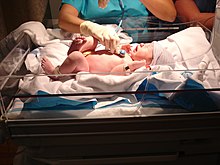Neonatology
As neonatology ( compound from Greek νέο- neo "newly" and Latin natus "born" and Greek -λογία -logía "teaching", "science") is defined as
- teaching the pathology and physiology of (human) newborns ;
- accordingly a branch of applied paediatrics , which deals with neonatal medicine (often also premature baby medicine) and newborn care.
scope
Neonatology deals with the special problems and their treatment of premature babies and sick newborns. In the last few decades, medicine has made immense advances in neonatology: better drugs that accelerate lung maturation , better ventilators and monitors for cardiac activity ( EKG ), oxygen / carbon dioxide exchange ( capnometers ), and oxygen saturation meters are available.
Usual procedures in device diagnostics in premature and newborn babies are today:
- Ultrasound , including Doppler sonography
- X-ray examinations
- Cross-sectional imaging ( computed tomography and magnetic resonance tomography )
- Electroencephalography and polygraphy
The viability of premature births begins in the 23rd week of pregnancy when the newborns have a birth weight of around 500 grams. In Germany, the chance of survival is 50:50 from the completed 24th week. In the following weeks of life, the chance of survival increases rapidly, in the 28th week it is already over 90 percent. Thanks to the improved perinatal care of sick newborns, infant mortality in Central Europe is now significantly lower. Expressed in figures: In Austria, infant mortality fell from 14.3 in the first year of life to 1,000 live births in 1980 to 3.0 in 2014.
Germany
education
Neonatology is a recognized focus of pediatrics in Germany . The priority designation "neonatology", the pediatric residency training and the appropriate training acquired in a neonatal facility upon completion.
Supply structure
The levels of care in obstetrics are divided into
- Maternity hospital
- perinatal focus for healthy pregnant women
- Perinatal center for the care of (high) risk pregnancies
In a maternity hospital, healthy pregnant women with more than 36 weeks of pregnancy, healthy newborns and without foreseeable complications are cared for.
In the perinatal focus, pregnant women after the 32nd week of pregnancy and non-life-threatening newborns with a birth weight of more than 1500 g are cared for.
In the perinatal center, pregnant women who are threatened with premature birth (before the 32nd week of pregnancy) or at additional risk (e.g. in the event of a malformation of the fetus) and up to the 35th week of pregnancy are cared for , as are pregnant women with insulin-dependent diabetic metabolic disorders with a fetal risk. Life-threatening newborns are also cared for there, both mature, life-threatening newborns, for example with critical heart defects, congenital metabolic diseases or severe pregnancy-related diseases (growth retardation <3rd percentile in preeclampsia , gestosis , HELLP syndrome ) and premature babies with a birth weight of less than 1500 g .
See also
Web links
- S2k guideline hypothermia treatment of asphyctic newborns of the Society for Neonatology and Pediatric Intensive Care Medicine . In: AWMF online (as of June 30, 2013)
- S1 guideline for the transfer of premature and full term babies to hospitals with the appropriate level of care provided by the Society for Neonatology and Pediatric Intensive Care Medicine (GNPI). In: AWMF online (as of April 30, 2013)
- www.gnpi.de Society for Neonatology and Pediatric Intensive Care Medicine
- www.neonatology.org Cedars-Sinai Medical Center, Los Angeles neonatology site - helpful databases and online calculators
- www.iowaneonatologyhandbook Complete and clear online neonatology handbook
swell
- ↑ Deaths and infant mortality since 1946. Statistics Austria , June 11, 2015, accessed on December 3, 2015 .
